Powerful partnerships
28 November 2019
There have been more than 23,000 gifts to the For All Our Futures campaign and thousands of people have benefited, from students and faculties to the community, the country and ultimately the world. Ingenio talks to three pairs of donors and recipients.
Donors: John and Leonie Hynds
Recipients: Unleash Space at the Business School; Peter Rachor, Hynds Entrepreneurial Fellow
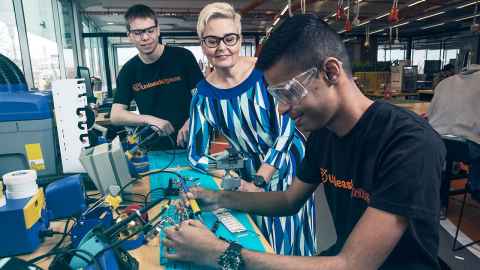
If you’re the type who walks with your eyes fixed on the pavement, the name ‘Hynds’ may be familiar. It’s all over our streets, embossed on many metal drain covers.
The Hynds family, through the Hynds Foundation led by John and Leonie Hynds, are major donors to the University, but their money most certainly isn’t going down the drain.
John Hynds’ company, Hynds Pipe Systems, was formed in 1973 and specialises in waste management. In 2017, the Hynds Foundation was one of six founding partners to provide large philanthropic gifts to set up the Unleash Space for five years, in the Centre for Innovation and Entrepreneurship (CIE). The Hynds family gift was also used to fund the Hynds Entrepreneurial Fellow, leading to the appointment of Peter Rachor, who was director for entrepreneurship and innovation at the University of Portland in Oregon for 11 years.
“We’re so grateful to John and Leonie,” says Wendy Kerr, director of CIE. “Being able to employ someone like Peter Rachor allows us to teach concepts of innovation and entrepreneurship to students and staff.”
Peter, whose remit is to work with every faculty, is based in the Unleash Space on the corner of Grafton Road and Symonds Street.
Within that area is the lively maker space, filled with useful tools and gadgetry, and there’s also the Collide Space. Everything is funded by donors.
“At the heart of the Unleash Space is that feeling that it’s everyone’s space,” says Wendy. “Leading universities overseas have innovation hubs and we’ve been able to replicate that here, thanks to philanthropy. In the Maker Space, anyone from any faculty can join, do a training session and then use the machines.”
There’s everything from sewing machines to 3D printers and a laser cutter. Student ‘creative technologists’ are employed to assist.
“When you have an idea in your head, it’s intangible,” says Wendy. “But when you make it, it becomes tangible. That’s a really important part of the innovation and start-up process.”
In the semester breaks, CIE runs experiential programmes such as Get Good Done (a social entrepreneurship programme), Summer Lab (for budding entrepreneurs) or Solve It, the corporate innovation challenge. Hynds was a sponsor in the 2018 Solve It challenge, in which companies gave students a tricky problem. Over the two-week break, students worked on how to get the public to learn about wastewater.
“The winning team came up with an interactive manhole cover they made on the laser cutter. It’s on display in the maker space.”
Wendy says CIE also runs workshops for the Hynds Company. “Our collaborators designed a drainage pipe and made the prototype on the 3D printer in an afternoon. Hynds’ innovation manager said normally they’d have to cast it in three and a half tonnes of concrete!
“The physical space and programmes around it allow us to have a much deeper partnership with Hynds. We help them solve problems, too.”
John Hynds says even though he left school at 17, he always had an innovative streak.
“I wasn’t so good with schoolwork, but I have a capacity to dream. Hynds is a creative and innovative company. Our Smarter Water project, led by my son Aaron, is a good example of linking modern technology with traditional infrastructure.”
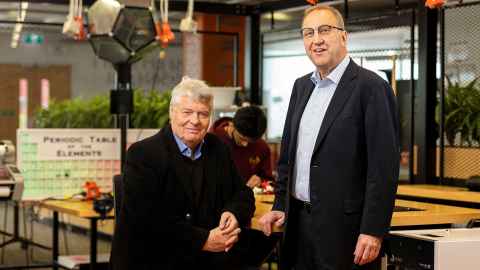
John and Leonie met at Manurewa High School. Its students and staff visit Unleash Space, and the University offers advice on how to run the maker space at Manurewa.
“Our Maker Space at Manurewa High School has inspired the students to develop their creative minds and understand entrepreneurial activities,” says John, who is also chair of the Manurewa High School Business Academy.
He says there are important reasons for providing philanthropic support.
“New Zealand can’t rely on being a commodity provider. Our future depends on our ability to innovate and be creative, to think laterally about solutions the world needs. Philanthropy not only provides money or resources, but it also gives us the chance to spend personal time with people to guide and influence the best result.”
Donors: Eric and Patricia Tracey
Recipient: FMHS
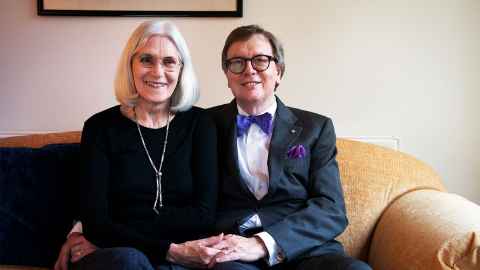
In London, at the Cricket World Cup final in July 2019, Eric Tracey’s pride in being a New Zealander pumped through his veins. Alumnus Eric, a business graduate who lectured at Auckland in 1972-73, has had a successful career with Deloitte and he and wife Patricia have lived in London for many years. He is chair of the NZ UK Link Foundation.
“I’m very proud of being a New Zealander and constantly want to live up to what being a good Kiwi requires. We were at the Cricket World Cup final. The Black Caps were magnificent in the way they played and in how they handled two ties being a defeat!”
Eric was the New Zealand Society UK’s New Zealander of the Year in 2014 for his contributions to New Zealand trade and business, sporting and fundraising causes. One of those causes is the University of Auckland.
“It’s good to do something that could make the world a better place,” says Eric. “I’m grateful to New Zealand for my education. Kiwi values are at the heart of my life, so I enjoy giving back a little through philanthropy and charitable work.”
In another role, as chair of the UK Friends of the University of Auckland, he met Professor John Fraser, Dean of the Faculty of Medical and Health Sciences (FMHS). Around that time, Patricia was facing a serious health battle, with a ‘superbug’ in her leg following surgery.
“Patricia was on antibiotics for nearly six years fighting this superbug, which had attached itself to the prosthetic in her leg,” says Eric. “The bug developed a film over it, which prevents antibiotics from getting to it. The antibiotics were stopping it spreading, but unable to kill the bug.”
While in Auckland, Eric told John about Patricia’s situation.
“I referred him to some excellent infectious disease specialists in Auckland who advised what could be done,” says John.
The situation also got them talking about the need for more research on such infections. John presented Eric with a project in 2018 that was particularly relevant to Patricia’s condition.
“The Traceys immediately and enthusiastically supported it because they could see the direct relevance,” says John. “Their generous donation provides long-term support for a research fellow.”
Eric says when the For All Our Futures campaign began, it was a “bit of a no-brainer” to want to support it. “Patricia and I knew firsthand there’s a need for research in the area of infectious diseases.”
The Traceys’ funding means Dr Ries Langley is now working on developing a new type of prophylactic vaccine that will reduce a patient’s risk of staphylococcal infection following surgery.
“Staphylococcus aureus is by far the most common bug in post-surgical infection,” says John. “It’s one of the best at developing resistance to antibiotics, so if you’re unlucky enough to get infected with a resistant strain, such as MRSA, antibiotics just don’t work as well.”
John says the Traceys are now family friends.
“One of the pleasures of being a Dean is getting to know people like Eric and Patricia. They provide tireless ambassadorial support for the University and have a real love of New Zealand. They are lovely positive people – so down to earth – and Eric is an avid supporter of the Black Caps. He delights in telling the story of how he became 12th man for the Black Caps in 2004!”
Donors: Charlotte Lockhart and Andrew Barnes
Recipient: Patricia Pillay, Kupe Leadership Scholar
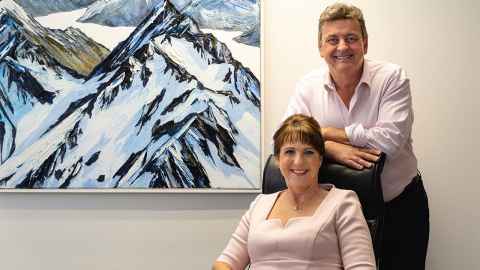
Student Patricia Pillay is doing her masters in anthropology and is one of 14 Kupe Leadership Scholars who receives financial support from donors for one academic year. The scholarship also provides leadership development and mentoring, in Patricia’s case from acclaimed anthropologist Professor Dame Anne Salmond.
Patricia’s scholarship has been funded by Charlotte Lockhart and husband Andrew Barnes, founders of New Zealand trusts business Perpetual Guardian, who are also supporting an architecture student with a Kupe scholarship. As employers, they recently shifted their staff to a four-day working week.
Charlotte says they like their staff to help out in the community.
“We encourage them to use one day every quarter for a charity or community programme. Being engaged with the community gives us a great basis for life and sets a good example for our children.”
That’s one of the drivers for the couple’s giving. Says Charlotte: “Andrew is an immigrant to New Zealand and firmly believes that if you live there, you have won the lottery of life and those who have the capacity should give back, whether it’s financially or through your time.”
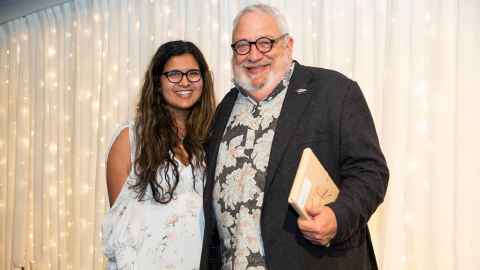
Patricia was happy to learn Andrew has a deep interest in archaeology. “He and Charlotte really wanted to support an anthropology student because their insights into human behaviour translate to the workforce.”
Charlotte says insight can help build a leader. “A good leader is prepared to stand out and try new things, be different and care for others. Andrew and I value leadership in New Zealand and being part of something like this programme is important to us.”
Patricia, who went to Avondale College, is the first in her family to go to university and says the scholarship meant she could continue her study.
She also feels privileged to have a mentor like Dame Anne. “She’s very supportive and has given me valuable advice about keeping my doors open and expanding my connections on a global platform. She’s also offered words of wisdom about studying overseas and the value of bringing that knowledge back to Aotearoa.”
Patricia is also learning from archaeologist Dave Veart, who has a masters in anthropology and law from Auckland and is a former staff member. “Dave was involved with the Ihumatao situation and explained why it’s significant. He’s been teaching me about legislation and applying what you learn in uni to real-life issues.”
This piece first appeared in the Spring 2019 issue of Ingenio magazine.
Contact Ingenio.